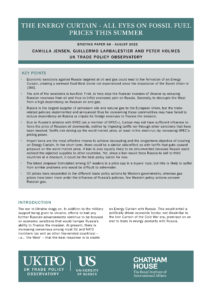8 June 2023


 Michael Gasiorek is Director of the UK Trade Policy Observatory and Co-Director of the Centre for Inclusive Trade Policy. He is Professor of Economics at the University of Sussex Business School. Peter Holmes is a Fellow of the UK Trade Policy Observatory and Emeritus Reader in Economics at the University of Sussex Business School. Manuel Tong Koecklin is a Research Fellow in the Economics of Trade at the UK Trade Policy Observatory and University of Sussex Business School.
Michael Gasiorek is Director of the UK Trade Policy Observatory and Co-Director of the Centre for Inclusive Trade Policy. He is Professor of Economics at the University of Sussex Business School. Peter Holmes is a Fellow of the UK Trade Policy Observatory and Emeritus Reader in Economics at the University of Sussex Business School. Manuel Tong Koecklin is a Research Fellow in the Economics of Trade at the UK Trade Policy Observatory and University of Sussex Business School.
Recently, there have been a series of reports in the media focussing on the challenges that electric vehicle (EV) manufacturers are likely to face, from the end of this year, in exporting electric vehicles tariff-free to the EU. The concern it because of the changes in the rules of origin (ROOs) requirements (for EVs and batteries) which will become more difficult from January 2024, and again from 2027 and 2028 onwards. (more…)
Jessie Madrigal-Fletcher June 8th, 2023
Posted In: UK- EU
Tags: Brexit, EU, Europe, goods, Single Market, TCA, Trade and Cooperation Agreement, trade policy, UK economy
 13 March 2023
13 March 2023
Emily Lydgate is Reader (Senior Associate Professor) in Environmental Law at University of Sussex School of Law, Politics and Sociology and Deputy Director of the UK Trade Policy Observatory
The UKTPO is pleased to re-publish this TaPP Network Workshop Summary, an output of a TaPP workshop in January with speakers Geraldo Vidigal (University of Amsterdam), Emily Lydgate (UKTPO/CITP), Ilaria Espa (USI/WTI), and Greg Messenger (TaPP/University of Bristol). Rather than a blog, this note summarises views of panel participants and the authors. It provides useful insights on the latest developments in this area and policy recommendations for the UK in navigating the new subsidies race between the US and the EU. (more…)
Cosmo Rana-Iozzi March 13th, 2023
Posted In: Uncategorised
Tags: Climate policy, Emissions, Emissions Trading System, Environment, EU, European Union, trade, Trade agreements, trade dispute, trade negotiations, trade policy, UK economy, UK Government, USA, WTO, WTO rules
Business Challenges and Opportunities
Difficulties and disadvantages of the TCA
It is now over two years since the introduction of the Trade and Cooperation Agreement (TCA) between the UK and the EU. The introduction of the TCA’s new trading arrangements has led to a range of challenges and opportunities for firms in the UK. In addition, the global economy has been beset by some further stiff challenges over the past few years, notably the Covid-19 pandemic, and, over the last year, the disruptions caused by Russia’s invasion of Ukraine to both energy markets and food security. The British Chambers of Commerce (BCC) undertakes regular surveys of its firms across a range of issues – including international trade, and the results of these are regularly published in BCC reports and press releases. The most recent BCC report, published in December 2022, evaluated the TCA two years since its inception and was largely based on the July 2022 survey. (more…)
Charlotte Humma March 1st, 2023
Posted In:
14 October 2022




Maria Savona is Professor of Economics of Innovation at the Science Policy Research Unit (SPRU) at the University of Sussex Business School and Full Professor at the Department of Finance and Economics at LUISS Business School in Rome. Filippo Bontadini is Assistant Professor in Applied Economics at LUISS and Associate Fellow at SPRU, University of Sussex. Valentina Meliciani is Professor of Applied Economics and Dean of the School of European Political Economy at LUISS. Ariel L. Wirkierman is Lecturer in Economics at Goldsmiths, University of London.
After the great recession of 2008-2009, the world economy seemed to enter a phase of de-globalisation or deceleration in globalisation. But, is this really the case? Are we actually just experiencing a reorganisation and regionalization of production and value chains? Are these trends similarly affecting Europe, Asia-Pacific and the Americas, or are there regionally distinctive trends? (more…)
Cosmo Rana-Iozzi October 14th, 2022
Posted In: Uncategorised
Tags: international trade, Protectionism, supply chains, trade, trade data, trade dispute, trade policy, trade remedies, trade wars
Subsidies granted by third states
The Foreign Subsidies Regulation (FSR)
The definition of a concentration
Ex ante mandatory notification: qualifying thresholds
An actual or potential distortive effect on the EU internal market
The definition of economic coercion
Compatibility with international law
Cosmo Rana-Iozzi October 12th, 2022
Posted In:
 12 September 2022
12 September 2022
Michael Gasiorek is Director of the UK Trade Policy Observatory and Co-Director of the Centre for Inclusive Trade Policy. He is Professor of Economics at the University of Sussex Business School.
Once again, the UK has a new Prime Minister, a new cabinet, and thus a new Secretary of State for International Trade. This is the 4th Secretary of State for trade in five years! (more…)
Cosmo Rana-Iozzi September 12th, 2022
Posted In: UK - Non EU, UK- EU, Uncategorised
Tags: agriculture, Australia, Brexit, China, Climate policy, Conservatives, CPTPP, digital trade, Free Trade Agreement, new zealand, Services, supply chains, trade, Trade agreements, Trade and Cooperation Agreement, trade negotiations, trade policy, World Trade Organization

 8 August 2022
8 August 2022
Minako Morita-Jaeger is Policy Research Fellow at the UK Trade Policy Observatory and
Senior Research Fellow in International Trade in the Department of Economics, University of Sussex. Guillermo Larbalestier is Research Assistant in International Trade at the University of Sussex and Fellow of the UKTPO.
The UK-Japan Comprehensive Economic Partnership Agreement (CEPA) came into force in January 2021, as part of the UK’s post-Brexit trading arrangements. CEPA was designed to largely replicate the EU-Japan Economic Partnership Agreement (EPA), to which the UK had been a party. On the face of it, there was little additional economic value to the UK, since CEPA provisions follow EPA provisions so closely, except for a chapter on digital trade. (more…)
Cosmo Rana-Iozzi August 8th, 2022
Posted In: UK - Non EU, Uncategorised
 Briefing Paper 68 – August 2022
Briefing Paper 68 – August 2022The importance of market power to policy analysis
Import tariffs, import bans or a buyer’s club price cap?
Cosmo Rana-Iozzi August 3rd, 2022
Posted In:
Share this article: ![]()
![]()
![]()
![]()
![]()
![]()

 6 May 2022
6 May 2022
L. Alan Winters is Professor of Economics at University of Sussex Business School and Founding Director of the UK Trade Policy Observatory and Guillermo Larbalestier is Research Assistant in International Trade at the University of Sussex and Fellow of the UKTPO.
The concept is simple: cut tariffs levied on food imports so the products become cheaper in the UK, right? In this blog, we look at the trade data and discuss the reasons why changing tariffs would hardly affect prices.[1]
In 2021, the UK imported £38.6 billion of food products[2] (equivalent to 7.6% of the UK’s total imports that year and about 46% of UK food consumption). Approximately 66% come from the EU and are already exempt from tariffs under the EU-UK Trade and Cooperation Agreement (TCA).[3] (more…)
Cosmo Rana-Iozzi May 6th, 2022
Posted In: UK - Non EU, UK- EU
Why is greater supply chain resilience desired?
The interest in supply chains is not just about resilience
What have been some of the policy responses?
The legitimacy of policy responses to supply chain resilience
What is the role of international coordination and free trade agreements?
• Economic and geopolitical shocks have raised concern over supply chain resilience whilst environmental problems highlight the need for sustainable supply chains.
• Resilient and sustainable supply chains require firms to have detailed knowledge of their production processes, and possibly labour standards both upstream and downstream and digitisation is making this traceability easier.
• In recent years, various countries have brought in a range of measures with a focus on enhancing the resilience of supposedly strategic sectors, but some of these policies have been introduced to protect domestic industry from foreign competition.
• The US has consistently introduced the greatest number of trade restricting measures, followed by the EU.
• Many of the policy interventions are also a direct response to concerns regarding China’s role in the global economy and policies pursued in China.
• The risk is that supply chain resilience is used as a get-out clause for a wide range of industrial policy interventions to disguise protectionism.
• We need to recognise that vulnerability can be either domestic or international and we need a taxonomy for understanding different possible legitimate reasons for being concerned about supply chains.
• In many circumstances, businesses themselves will be best placed to build resilience, hence we need clearer analysis of the circumstances under which government policies may be justifiable.
• Supply chain vulnerabilities have a strong international and multilateral dimension and will require cooperation and coordination between countries.
• This Briefing Paper suggests ten ways more coordination could be achieved. The aim is not simply to foster greater supply chain resilience, but also to avoid the poor use of, and justification for, a suite of pick and mix national policies and to minimise the risks of disguised protectionism. (more…)
Cosmo Rana-Iozzi April 12th, 2022
Posted In: